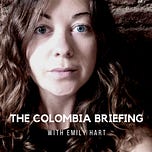🗞️ Guerrilla group Ejército de Liberación Nacional (the ELN) kidnapped a family of six this week in Arauca, near the border with Venezuela.
The group were targeting Ricardo Ramos, a former member of the now-defunct guerrilla group Fuerzas Armadas Revolucionarias de Colombia (the FARC), who was in the area visiting relatives. When family members attempted to resist the abduction of Ramos, they were kidnapped along with him.
Following local military assaults on the ELN by the Colombian army, carried out with the intention of putting pressure on the group, Ramos and his family were released on Wednesday. Two soldiers were killed during the confrontations.
The ELN’s continued kidnappings have been a major obstacle in peace negotiations with the Colombian government, due to resume later this month in Venezuela.
The targeting of Ramos and his family also reinforces recent claims by former FARC members that they are not receiving sufficient protection, and that the implementation of the 2016 peace accords is stalling.
Already this year, two former FARC combatants have been murdered. There are also significant delays in the payments and benefits due to signatories of the peace deal, who are now threatening protests later this month if the situation continues.
A UN report on the issue is due to be published later this week.
🗞️ Regional tensions peaked this week with the inauguration of Nicolás Maduro as president of Venezuela (his third term) following a disputed election last July and subsequent months of political crackdown.
The Presidents of Cuba and Nicaragua attended the ceremony, while Chile, Peru, Panama, and Argentina refused to even send a delegate. Colombia chose to send a delegate - its ambassador to Venezuela, Milton Rengifo - prompting widespread criticism, as well as an open letter signed by 500 public figures, including former president of Colombia Juan Manuel Santos.
Protests took place across Venezuela in the lead-up to the inauguration, despite the streets being filled with soldiers. There were numerous political arrests, detentions, and disappearances.
There were also major disruptions to mobile phone service and Internet access, with more than 50 news sites blocked, along with X (formerly Twitter), and the sites of numerous human rights groups.
Opposition candidate Edmundo González, who also claims to have won the election, had claimed he would return to Venezuela for his own parallel inauguration, but the event was called off at the last minute.
Opposition leader María Corina Machado made her first public appearance in months at an anti-government march in Caracas on Thursday, where she was briefly detained - though the government deny involvement.
Despite promises that borders would remain open for the inauguration, the border with Colombia was unilaterally closed on the Venezuelan side between Friday and Monday, due to an alleged “international conspiracy to disturb the peace of Venezuelans.”
Protests were seen in cities across Colombia on the day of the inauguration, as the country’s substantial Venezuelan population took to the streets to speak out against Maduro’s regime.
Colombia’s president Gustavo Petro made statements on X (formerly Twitter) defending his stance on Venezuela, saying that July’s elections were not free - due to the US economic blockade - and therefore neither candidate can be recognised as having won. Petro continues to stake hopes on a negotiated solution, offering ongoing support for dialogue between Venezuelan government and opposition.
Former president Álvaro Uribe, meanwhile, called for military intervention as a solution – to which Petro issued to a request that Uribe stop thinking about the death of brothers, making reference to the Biblical story of Cain and Abel.
Other government officials, including the foreign and interior ministers, met in the border city of Cúcuta to review the security plan for the 2,000-kilometre border, in preparation for an anticipated surge in arrivals from Venezuela following the inauguration.
US President Joe Biden has raised the reward for information leading to the arrest or conviction of Maduro on drug trafficking charges - from 15 million dollars to 25 million dollars. Biden also issued rewards for two of Maduro’s ministers and imposed new sanctions against numerous other officials, including the head of the state oil company, PDVSA.
Canada, the United Kingdom, and the European Union also imposed new sanctions on Venezuela this week - measures which Petro has publicly condemned and sworn not to partake in.
Venezuela is still to host the Colombian government’s negotiations with the ELN guerrilla group, as well as acting as guarantor of those peace talks.
🗞️ And a new study of Colombia’s mummies has revealed that the practice of mummification was much more widespread - and much more recent - than previously thought. An interdisciplinary group from the National University joined forces to study a collection of 34 mummies – the first major study of this group of remains.
Analysing bones, DNA, and teeth, researchers found that numerous Colombian indigenous groups practised mummification, and that the practice continued as late as 1700 AD - long after the colonisation of the country by the Spanish.
Studies of oxygen levels in the bones also showed that mummification was practised in lowland areas like the Eastern Plains, and not only by Muisca and Guane communities in high altitude areas, as had previously been thought.
The study will be now expanded to other collections of remains, and a landmark book on the findings will be published later this month.












Share this post